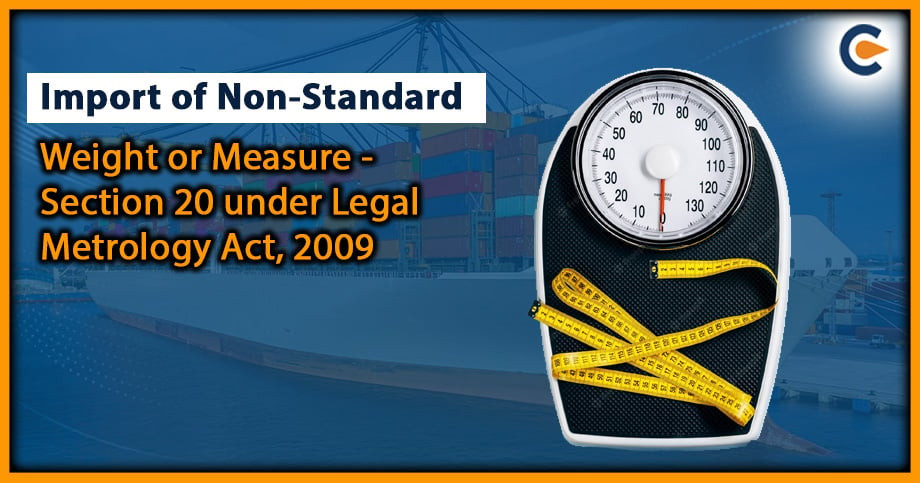The science of weights and measurements is known as metrology. Legal metrology is an Act regulating any applied metrology governed by legislation or government order. The scope of legal metrology differs in each nation. The legal metrology Act in most nations involves measurements for individual financial, health, and environmental protection. In India, the Legal Metrology Act ensures international standards in weights and measures. Section 20 under Legal Metrology Act, 2009, strictly ensures that non-standard weights and measurements are not to be imported to India.
What is Section 20 under Legal Metrology Act 2009?
According to Section 20 under Legal Metrology Act, 2009. The Non-standard weights and measures are not to be imported to India. No weight or measure, whether complete, one or component of any machine or part of the machine shall be imported unless it conforms and qualifies standards of weight or measure established under this Act.
What Is Standard Weight Or Measure Section 20 Under Legal Metrology Act, 2009?
Chapter II of the Act declares that the standard weight or measures will be any weight or measurement that conforms to the standard unit of such weight or measure (based on the metric system or prescribed derived units) and also envisages the provisions of Sec. 7(i.e., the physical characters, configuration, premises details, materials used, equipment, period of re-verification, methods or procedures of tests should be such as may be prescribed). Non-standard or unverified weights and measures are subject to seizure and forfeiture.
Objectives of Section 20 under Legal Metrology Act, 2009
The followings are the objectives of section 20 under Legal Metrology Act, 2009
- To govern and ensure weights and measurements of trade and commerce.
- To establish and enforce weight and measurement standards equivalent to international standards.
- Weights, measurements, or numbers govern item manufacturing, sale, and usage. So it is necessary to ensure that section 20 of the Act allows only the standard weights and measures and avoids non-standard weights and measures.
- To Keep the Indian Metric system on par with National Standards (metre, kilogram, etc.)
Standards of Weights and Measures under the Act
The followings are the weights and measures eligible for Legal Metrology Act. Every unit of weight or measure is in relation metric system based on the international system of units.
- Length shall be in metres.
- Mass shall be in kilograms.
- The time shall be in seconds.
- Electric current shall be in ampere
- The thermodynamic temperature in Kelvin
- The luminous intensity in Candela
- Amount of substance in mole
Objectives of Weighing and Measuring Equipment
The Weighing and Measuring equipment have been discussed below and is necessary for every importer. If any of the weighing and measuring instruments do not meet the requirements below, then that equipment may not be given a license by section 20 under the Legal Metrology Act.
- The equipment used for measures and weights for goods must be accurate and determined with specific tolerances and standards. Here are a few examples of weighing and measuring equipment that must be stamped.
- Weighing and measuring equipment used for day-to-day activities like fruit and vegetables, meat, fish, postal services, sweets etc.
- The measure of volume: edible oil measuring jars, milk measuring jars, wine glasses and carafes, beer glasses and automatic measuring meters, petrol pumps, etc.
- Length Measure: commonly known as ‘yardsticks’, usually used in metre measures used for fabrics, material, electrical, ribbon, cable, etc.
- Flexible tapes used for carpet and floor coverings.
Government Legislation to Regulate Legal Metrology Act
The government enacted the Legal Metrology Act 2009[1] to eliminate anomalies and simplify the laws. It also became vital to maintain regulation on weights and measures to defend consumers’ interests and keep the trade free of unnecessary intrusion. The government has specific “Government-authorised Test Centres” to verify stipulated weight or measure.
Specific Laws to regulate Legal Metrology Act are as follows:
- The Legal Metrology Act, 2009
- The Legal Metrology (Packaged Commodities) Rules, 2011
- The Legal Metrology (General) Rules, 2011
- The Legal Metrology (Approval of Models) Rules, 2011
- The Legal Metrology (National Standards) Rules, 2011
- The Legal Metrology (Numeration) Rules, 2011
- The Indian Institute of Legal Metrology Rules, 2011
Verifications of Weights and Measures
The weights or measures in a transaction should be validated and verified. The Central and State governments will specify the weights and measurements that Government Approved Test Centres must verify. The Federal and State Governments will notify the Test Centres at time-to-time based on the requirement.
Enhancements in the Legal Metrology Act
Any person or manufacturer who uses a weight or measure in a business transaction or trade must provide the weights or measurements for verification at the following locations:
- At the specified legal metrology department’s premises, the state of manufacturing and state of import should be verified.
- The legal metrology officers where the business uses weight or measure must re-verify and stamp it regularly when the license expires.
- Weights and measurements utilised by industries for internal purposes and which do not have a link with the quantity given to the customer need not be re-verified.
- Declarations of the weights and measures essential in their web page.
- If a pre-package includes a commodity, then there should be ‘Best before’ or ‘Use by Date, Month, and Year’ must be marked.
Penalties under the Legal Metrology Act
The Act’s offences and penalties are outlined of the Act is outlined in Chapter 5. Suppose the importer does not abide by section 20 under Legal Metrology Act, 2009. The following penalties may be given.
- Section 27 of the Act states that if the manufacturer or importer imports the non-standard weights or measures to India against section 20 of the Act, then they are punished by a fine of Rs.20, 000 for the first offence, imprisonment for up to 3 years for other subsequent crimes.
- Sec. 36(1) of the Act ensures punishment of up to Rs.25, 000/- for the first crime, a fine of up to Rs.50, 000/- for the second, and a fine of up to Rs. 1 lakh for the third violation.
- Section 38 of the Act establishes that if an importer imports a non-registration of weights and measures. The violation is punished by a fine of up toRs.25, 000/-, and for the consecutive crime, by imprisonment up to six months, or by fine, or both.
- Section 32 of the Act penalises the product’s importer, packer for failure to register under the Act.
Conclusion
The Legal Metrology Act, 2009 is the primary legislation that deals with weights and measurements. The legal Metrology Act establishes standards for weighing, measuring, and measuring devices. It safeguards consumers, the environment, and traders and is mainly concerned with fair trade in India. To ensure all this, section 20 under Legal Metrology Act, 2009 track non-registration measurements and measuring tools and avoid license. It tries to create trust in customers, the government, business people, and merchants. It regulates unfair trade practices.
Read Our Article: Penalties Under Legal Metrology Act – An Overview











